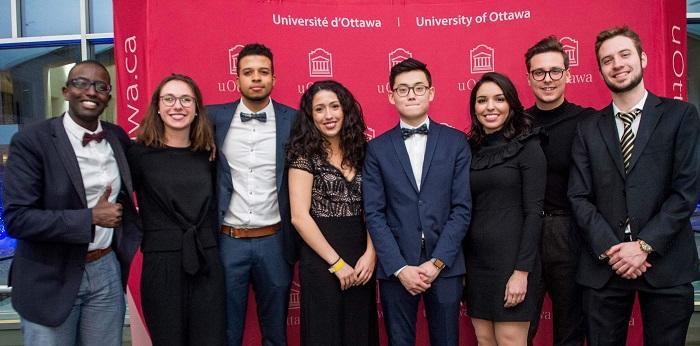By Brandon Gillet
University of Ottawa political science students went head-to-head in friendly competition with eight Quebec university delegations at the Jeux de la science politique, held on campus from January 12 to 14, 2018.
The annual French-language event pits university teams against each other as they undertake various academic, sports and social challenges. A record 230 student delegates took part in this year’s contest. Laval University won top prize and uOttawa came a close second.
This was the first time uOttawa had hosted the competition, now in its eighth year. Fourth-year student Enkhjin (Enzo) Zorigtbaatar, who led the uOttawa organizing committee, called this year’s competition a great success.
“All nine delegations were at the top of their game and brought a lot of really diverse ideas,” he said. “The visitors told us they really enjoyed their stay at uOttawa and were impressed by the FSS facilities and the efforts of everyone involved in organizing the event.
“I’m really proud of the uOttawa organizing team. They’re all MVPs in my mind.”
Health challenge
In previous years, the academic challenges – such as speeches, press releases and case studies – were based on a model United Nations format, which gave country delegations a chance to exercise vetoes to halt the simulation.
However, there was no danger of that being a factor this year because the teams, each representing a different country, presented plans at a mock World Health Summit aimed at promoting global health and fighting pandemics.
“We decided on this scenario because health is a common goal,” Zorigtbaatar said. “There is so much protectionist sentiment in the world today, but when it comes to health, borders can’t be an issue.”
In addition to showing off their academic skills, participants built camaraderie through networking activities and ten-round games of dodgeball.
This year, each team was also asked to carry out two philanthropic activities before the competition, such as volunteering for a food drive or soup kitchen. Zorigtbaatar said that while many of the participants aspire to be elected to Parliament one day, the organizers felt it was important to stress that being a politician involves more than sitting in the House and creating laws.
Unexpected victory
Last year’s competition was held at the University of Montreal, where Zorigtbaatar led his team to victory. Bringing home uOttawa’s first championship title helped spread the word. The games require a sponsor, so students must sell the idea of hosting them to the campus community.
“We weren’t expecting to win last year,” he said. “When we did, I talked to a few friends and we thought we could put together the best edition yet. So we put our ideas together and pitched it to the faculty.”
Zorigtbaatar, whose family immigrated to Canada from Mongolia when he was nine, went to school in Sherbrooke before completing high school in Gatineau. He chose the uOttawa political science program because politics has always been a passion and he wanted to study it in a bilingual setting.
“Classes are essential, but students get a chance to put it all into action at competitions like this,” he said. “They are forced to collaborate, learn to overcome differences and work toward a common goal, which benefits the future of Canadian politics.”
